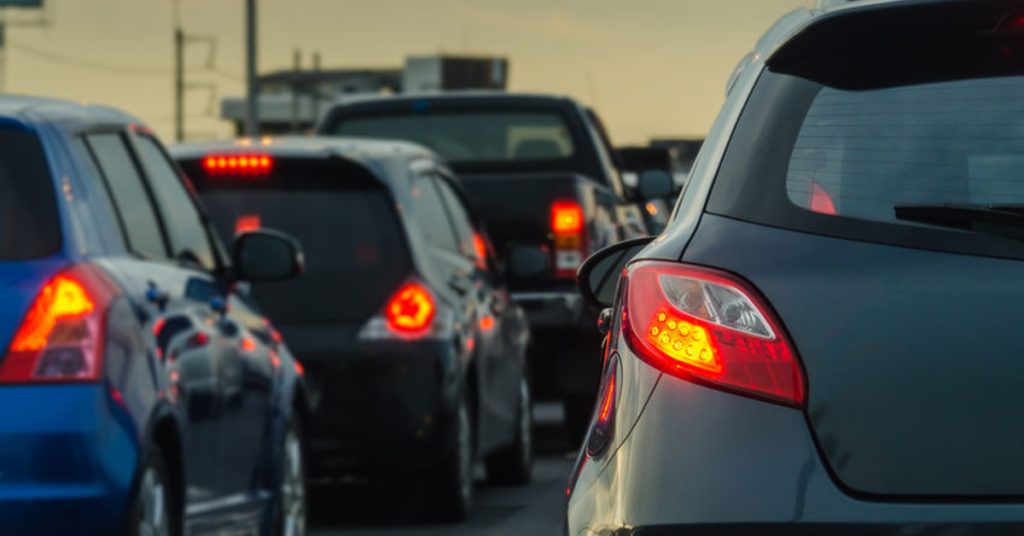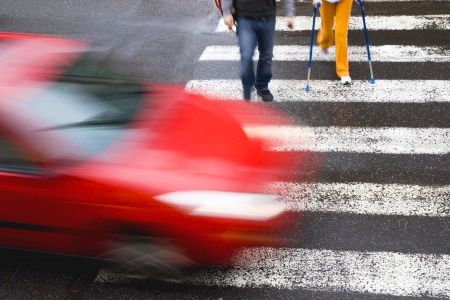Personal Injury
Ready to Go? Getting out of Boston Safely for Thanksgiving

Driving to your Thanksgiving destination can be demanding. Read our tips to help you get there safely with a little less stress (if that’s possible).
We all want to know the secret to beating the Thanksgiving week traffic out of Boston. To help, we have put together a few travel tips. Please travel safely, be patient and enjoy this special time of year with your family and friends.
Traffic Apps and Resources. Here are a few websites for travelers: Boston.com/Traffic or Mass511.com. Traffic apps: Google Maps, Waze, AAA or GoTime.
Boston’s Worst Traffic Bottlenecks. AAA is reporting on the Boston region’s 10 top traffic bottlenecks for the Thanksgiving holiday weekend. They include several locations along Interstate 93, Interstate 95 and the MassPike (Interstate 90). Read the full list now before you drive. Try to avoid them if you can.
Check Your Car. Whether you drive your own car or rent a vehicle, spend a few minutes in the driver’s seat before you leave. Make sure you know how to use key features such as the blinkers, headlights and the heating system. Many new vehicles now have complex infotainment systems. Decide now what features you need to use for this trip – and which are distractions.
Essentials. Make sure your motor vehicle registration is in your glove compartment and that you have your health insurance card (or cards if you are a parent traveling with children).
Choose the Best Travel Times. AAA predicts a 3 percent increase in holiday travel this year, so we know to expect more traffic. Tuesday night and Wednesday afternoon will be the most challenging time, according to Waze. Another busy travel time is Thanksgiving Day between 11 a.m. and 1 p.m.
Plan to Stop. Take a break to fend off fatigue and let kids burn off energy. Stop once every two hours.
Gas Up and Emergency Kit. Always start your trip with a full tank of gas. Then, make sure you have a strong emergency kit, with jumper cables, a quart of motor oil, coolant, a first aid kit and a toolkit. Find your auto club membership, a safety vest, a flashlight with extra batteries and a roadside flare. Finally, pack warm clothes, blankets and your cell phone charger.
Commit to Use Your Cell Phone Safely. Our best tip for you is to turn your phone off. If you are traveling with someone, ask them to hold your cell phone and receive occasional phone calls or traffic alerts for you.
When traffic is heavy, a driver can cause a multi-car pile-up with a single glance at a cell phone – and that’s on any given day. The traffic is much worse during the Thanksgiving Week. That is why texting while driving is banned in Massachusetts and 46 other states, and why many are pushing to see Massachusetts ban all cell phone use by drivers.
No Drinking and Driving Accidents. Drunk driving accidents increase during the holiday season, starting with Thanksgiving week. Always, always travel with a designated driver who agrees not to drink. Or do not consume alcohol. No one ever regrets making this decision the next morning.
Cycling and Pedestrian Safety is Top Concern in Central Square in Cambridge
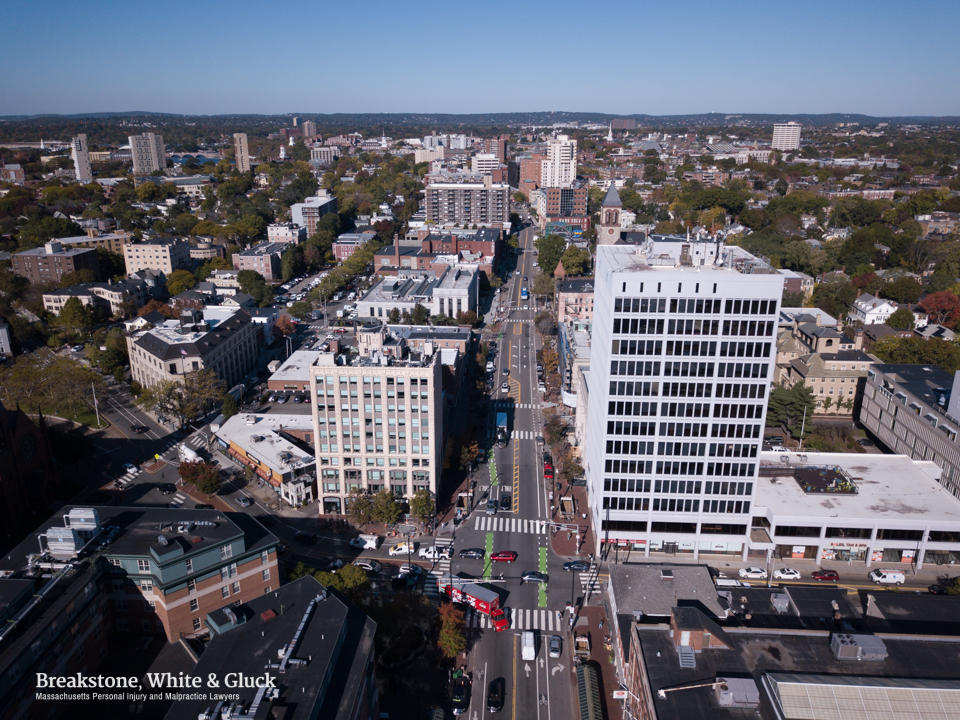
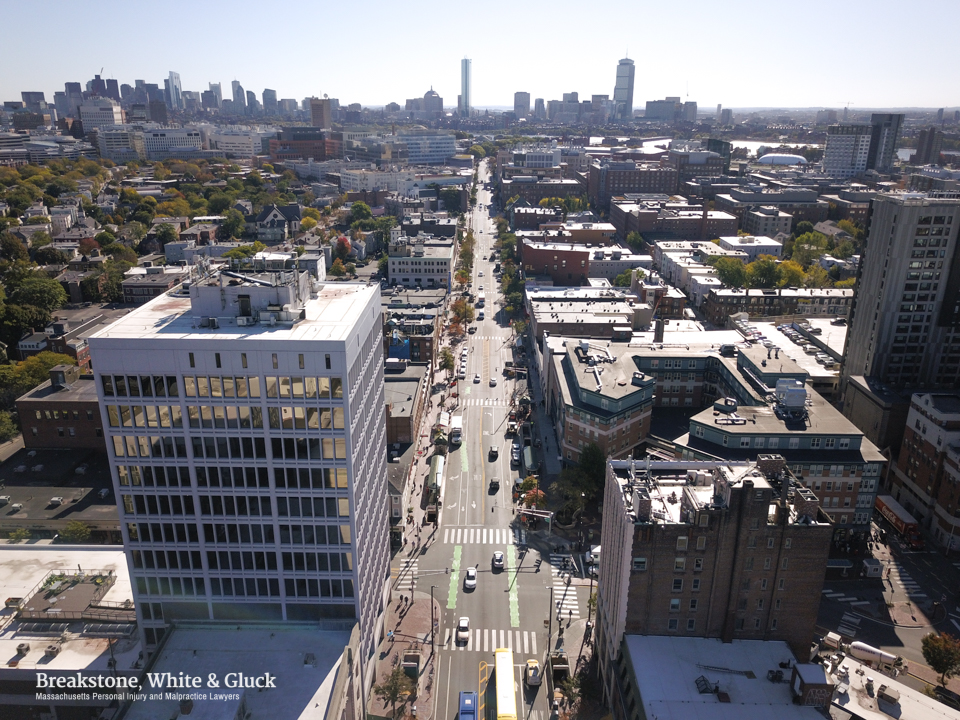
Safety for pedestrians and cyclists is a top concern in Central Square in Cambridge.
Central Square is located around the intersection of Prospect Street, Massachusetts Avenue and Western Avenue in Cambridge. This area is a commuter hub; the Central Square MBTA subway station and bus stop are located here, near Cambridge City Hall. The state of Massachusetts has designated Central Square as an official cultural district, for its mix of theater and arts, restaurants and history. The NECCO building was long part of that history, but these days, 250 Massachusetts Avenue is now the Novartis’ global headquarters. The Cambridge YMCA is there and MIT is nearby.
Over the years, there have been numerous pedestrian and bicycle accidents in Central Square. Central Square was the #1 location for bike crashes in Massachusetts from 2005-2014, according to the Massachusetts Department of Transportation (MassDOT). It was the 5th highest pedestrian crash location. The City of Cambridge has worked to improve safety by improving crosswalks and adding bike lanes across the city. In December 2016, new bike lanes were laid down in Central Square, northbound on Massachusetts Avenue between Sydney and Douglass streets.
We recently went up over Central Square. Please take a look and share this blog with anyone who travels in this area, whether they walk, bike, drive or travel by Uber. From a different angle, we hope you gain a better understanding of the traffic in this area.
We also recently visited Inman Square.
About Breakstone, White & Gluck
At Breakstone, White & Gluck, our Boston personal injury lawyers fight for justice for those who have been seriously injured by the negligence and wrongdoing of others. Our lawyers have been recognized as among the top personal injury and medical malpractice lawyers in Massachusetts and New England. We are committed to protecting cyclists through our Project KidSafe campaign, which has donated over 15,000 helmets to children in the first 5 years. If you have been injured, learn your rights. Contact us today at 800-379-1244 or 617-723-7676 or use our contact form.
Massachusetts Lawmakers Consider Bill to Prevent Insurance Companies from Dog Breed Discrimination

Massachusetts lawmakers are considering a bill to prevent insurance companies from discriminating against homeowners who own certain dog breeds.
Massachusetts lawmakers are considering a bill to prevent insurance companies from discriminating against homeowners based on their dog’s breed.
Rep. Jack M. Lewis (D-Framingham) is the sponsor of H.554, which would ensure dog owners can buy insurance to provide compensation to anyone injured by their pet.
Under the proposed bill, insurance companies would not be allowed to refuse to offer homeowners insurance or renters insurance coverage based on the specific breed of an individual’s dog. The insurer would be prohibited from refusing to issue a policy, renewing a policy, canceling a policy or raising the premium based on the dog’s breed.
The bill provides an exception for a dog which has been designated a “dangerous dog,” by a local community.
At Breakstone, White & Gluck, our attorneys have represented victims of Massachusetts dog bite attacks for more than 30 years. Massachusetts has a strict law when it comes to dog bites. Under M.G.L. c.140 § 155, a dog owner or keeper is strictly liable for injuries inflicted by a dog. Their homeowners insurance policy typically provides compensation to the victim. With the exception of young children, victims have to show they were not teasing or tormenting a dog or trespassing.
Years ago, the cities of Boston, Lowell and Worcester banned certain breeds of dogs, such as pit bills, because they had a reputation for being dangerous. This practice became illegal in Massachusetts in 2012, with passage of St.2012, c.193. Here is a summary of the animal control law written by the Massachusetts Society for Prevention of Cruelty for Animals (MSPCA).
Yet certain insurance companies are still asking about dog breeds. At the State House this week, a representative from the Property and Casualty Insurers Association of America said dogs are the industry’s “single biggest loss.” He was testifying before the Joint Committee on Financial Services.
Meanwhile, the MSPCA supports the Massachusetts bill, saying breed-specific policies are a bad idea. The organization says a better solution is educating the public and dog owners on dog behaviors.
The MSPCA estimates 4.7 million dog bite injuries occur in the U.S. each year, with 800,000 victims requiring medical treatment.
At Breakstone, White & Gluck, we support full compensation for anyone who has been injured by a dog. Young children often suffer dog bite injuries. But others are also at risk. Over the years, our dog bite attorneys have represented clients of all ages who have been bitten suddenly and without warning – including cyclists riding bikes. We have represented clients in the Boston area and across Massachusetts. When a dog bites, medical care is critical – in the hours, days and months following an attack.
This medical care comes with other costs. Victims – or family members – may have to take time off from work to receive medical care and deal with the emotional pain and stress of a dog bite attack. Our attorneys have represented those injured by dogs as well as family members who witnessed the terrifying attack and suffered severe emotional distress as a result. It is a long journey back after a dog bite injury and it’s important for insurance companies to provide compensation.
Our Work for Dog Bite Victims
Read about our results for clients injured by dog bite attacks in Massachusetts.
About Breakstone, White & Gluck
With over 100 years combined experience, Breakstone, White & Gluck specializes in representing those who have been injured by the negligence and wrongdoing of others in Massachusetts. We are experts in handling dog bite and animal attack cases. If you have been injured, learn your rights. For a free legal consultation, contact us at 800-379-1244 or 617-723-7676 or use our contact form.
Redesign Ahead for Waltham’s Most Dangerous Roads and Intersections
Some of the region’s most dangerous roads and intersections are about to be redesigned in Waltham.
The City of Waltham released its 180-page transportation master plan last January. Some of the steps will drastically change the roads – for example, removing a traffic lane on Lexington Street, acquiring land to expand a road and a “super crosswalk.” The goal is to reduce Waltham car accidents and make it easier to travel the city. This is a 10-year master plan, but some changes have already been made.
Over the summer, the city removed a lane of traffic on Lexington Street, from Curve Street to Lake Street. The city’s goal was to reduce car accidents caused by speeding. The speed limit is 30 mph, but drivers often travel 40 to 45 mph.
The street was repainted with two southbound lanes and one northbound lane. Over the first few days, there was a lot of confusion. Some drivers continued to travel on the old lane – head-on into traffic in the new lane – putting vehicles at risk for a collision, according to a news report.
Pedestrian Deaths in Boston are Rising
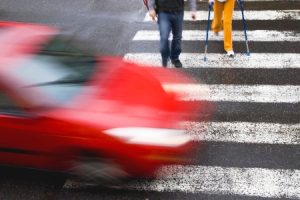 Pedestrian safety was the focus of several NBC Boston reports last night. One segment was called “Boston’s Crosswalk Crisis” and another was called “Cro$$walk Crisis: Private Funding for Public Ways.” They are worth viewing for anyone who lives or works in Boston. A few figures from the reports:
Pedestrian safety was the focus of several NBC Boston reports last night. One segment was called “Boston’s Crosswalk Crisis” and another was called “Cro$$walk Crisis: Private Funding for Public Ways.” They are worth viewing for anyone who lives or works in Boston. A few figures from the reports:
- Pedestrian deaths rose 15 percent in Boston in 2016.
- Nine pedestrians have died this year, up 30 percent from this time last year.
- In addition to these deaths, 384 pedestrians were hit and required medical attention during the first half of 2017.
The news station also reported that some Boston residents are taking charge and raising funds to build crosswalks. This is not cheap. In the South End, Tremont Street residents are trying to raise $25,000 for crosswalks at the intersection of Tremont and Union Park and Upton and Columbus and Rutland.
As pedestrian fatalities have risen, the City of Boston’s Vision Zero Task Force has been working to make the city safer for pedestrians and cyclists. The task force’s goal is similar to Vision Zero task forces in other major cities – to eliminate transportation deaths by 2030.
The rise in pedestrian deaths is discouraging, especially since the task force was recently successful in lowering default speed limits in Boston. Lower speeds mean fewer accidents because drivers have more time to respond.
The task force had to obtain Legislature approval to lower the city’s default speed limit from 30 mph to 25 mph. Now all cities in Massachusetts can opt-in and lower speed limits if they choose. A number of communities already have, including Cambridge, Somerville, Quincy and Milton.
Boston Pedestrian Accident Lawyers
At Breakstone, White & Gluck, our Boston pedestrian accident lawyers have over 30 years of representing those who have been injured and killed by negligence in Massachusetts. Our attorneys have represented numerous families who have lost loved ones in pedestrian accidents, even in the crosswalk where they should have been safe. In 2005, one of our clients was struck by an MBTA bus right in a crosswalk on Washington Street in the South End of Boston.
Drivers Have to Slow Down
Boston has some of the most congested roads in Massachusetts and many have been taken over by construction over the past few years. Drivers need to take even more care when traveling in the city and watch out for pedestrians and cyclists. Yet they often don’t and the roads tend to be more congested this time of year in Boston and Cambridge, as college students move in and elementary schools re-open.
Walk down any city street and chances are, you will see someone sitting in a car at a traffic light or stopped in traffic, ear to cell phone. In-vehicle devices which allow hands-free talking or map out directions are not always safer, either. When it comes to intersections or at parking garages, shopping plazas or schools, drivers need to give the road their full attention – and slow down.
Contact Breakstone, White & Gluck for a Free Legal Consultation
If you or a loved one has been injured in a Boston pedestrian accident, you may have the right to seek compensation from the responsible driver. Contact us for a free legal consultation at 800-379-1244 or 617-723-7676 or use our contact form.
You can also read about Breakstone, White & Gluck’s recent settlements and awards for clients in pedestrian cases.
6 Tips for Boston and Cambridge College Students Who Are Moving Into Off-Campus Housing

Many college students heading to Boston will be living in off-campus housing. The attorneys of Breakstone, White & Gluck share safety tips and resources.
College students are just days away from starting the Fall semester. In Boston and Cambridge, we urge students to make time for an extra lesson on safe housing. Make sure you understand your rights as a tenant and your landlord’s responsibility to maintain a safe property.
Boston and Cambridge have more than 40 colleges and universities. Because of a shortage in dorm space, many students end up in off-campus housing. Unfortunately, some find themselves dealing with unresponsive landlords who want to collect rent, without doing the work to maintain a property. If you are in this situation, it is important to remember that if a landlord is charging you rent, you have the right to a safe and sanitary apartment.
When a landlord is unresponsive and negligent, it can lead to many problems. It can result in sanitary issues, such as mold, rodents or a bug infestations. It can also lead to broken equipment (for instance, a broken smoke alarm, which needs to be addressed right away).
Porch collapses and fires are two of the most common and serious types of premises liability accidents. As a result of landlord negligence, over the past 10 years, five college students have died in off-campus fires in Massachusetts, according to the state’s website.
Protect Yourself From ATM Skimming

Take the right steps to protect yourself from ATM skimming. Many Massachusetts consumers have been targeted.
You insert your ATM card and out comes cash for the week. Simple, right? Next time, pay closer attention. Many Massachusetts consumers are being scammed – or skimmed – for their financial information, at a tremendous price.
ATMs – automated teller machines – are a convenient way to get cash or make deposits. Unlike banks, they are always open and accessible.
But they are vulnerable to ATM skimming, when thieves install hidden electronic skimming devices on an ATM to record a consumer’s financial information. Massachusetts has seen several recent cases.
Just this week, Cambridge Police issued an alert, seeking a man who fraudulently ran up $800 on a Cambridge woman’s ATM card. Police say he may have skimmed her financial information at an ATM in Boston. ATM skimming rarely claims just one victim, though. In June, the Lowell Sun reported on two men who pled guilty after ringing up over $100,000 on 100 credit card numbers they skimmed in the Boston area. Other stories have also been reported in Framingham, Burlington and on the South Shore
The problem is skimming devices are often small and look like part of an ATM, so consumers may not notice them, even if they are looking.
Use caution at the ATM machine. We suggest the following tips to help you protect your financial information:
- Examine the card slot before inserting your card. Look for anything loose, crooked, damaged or scratched. If you observe anything suspicious, do not swipe your card. We suggest you read this article, “How to Spot and Avoid Credit Card Skimmers,” by PC Magazine.
- Thieves also need your PIN code. They often record your information through hidden cameras. When entering your PIN, cover the keypad with your other hand to prevent your PIN from being recorded.
- Walk away from an ATM if you notice someone watching you or you sense something is wrong with the machine.
- Avoid ATM machines with minimal supervision. For instance, try not to use stand-alone ATM machines in convenience stores, bars or parking lots.
- Also beware of skimming devices when paying at gas stations.
- If an ATM does not return your card when a transaction is over, report the incident immediately to your financial institution.
- Never give out your bank account number or the PIN for your ATM card. If someone calls you and asks for your information, hang up and report the call to your local police department.
- Monitor your account for unauthorized transactions and report them to your financial institution immediately. Most banks offer online access, which allows you to check your statements easily.
- Set a daily cash withdrawal limit. Ask your bank and credit card company to notify you of transactions—these can be sent right to your cell phone.
- Check in on senior citizens in your family or neighbors. Tell them you are concerned about ATM skimming. Remind them to check their bank accounts, and also, to never give their financial information out to callers over the telephone.
- The most important step? Contact police and your bank if you suspect anything suspicious. The sooner police and your financial institution can start investigating, the better for everyone using the ATM machine.
If you do find yourself a victim, remember you have rights. Under Massachusetts law, consumers are only liable for up to $50 if they are the victim of credit card or debit card fraud. But you must report the fraud immediately to avoid any financial losses. Read this article to learn more.
For Cycling Safety: Dutch Reach Method Makes the Massachusetts Driver’s Manual
Cyclists may now ride safer near parked cars, after a recent update to the Massachusetts driver’s manual. On page 109, there is a new title, “The Danger of Open Doors to Bicyclists,” and instructions for the Dutch Reach method of exiting a car.
A common practice in the Netherlands, the Dutch Reach method calls on drivers to park and take three simple steps:
- Check your rear-view mirror.
- Check your side-view mirror.
- Open the door with your far hand, the hand farthest away from the door.
This last step forces drivers to turn their bodies, so they can see cyclists and pedestrians coming from both directions.
A Cambridge man campaigned for the change, which was announced by the Massachusetts Department of Transportation on May 30th. According to The Boston Globe, Michael Charney launched the website dutchreach.org following the death of Amanda Phillips, a 27-year-old barista at Somerville’s Diesel Café. Phillips was riding her bicycle in Inman Square in Cambridge when she struck the open door of a parked Jeep. As a result, Philips was pushed into the street and collided with a dump truck.
This is known as a dooring accident or a car-dooring crash. We have represented numerous cyclists in these accidents, which can cause very serious injuries and are more common than you may realize. According to the City of Boston, dooring accidents accounted for up to 13 percent of all bicycle crashes between 2009 and 2012.
Massachusetts is one of 40 states which have passed dooring laws, according to the League of American Cyclists. Under M.G.L. c. 90 § 14, “No person shall open a door on a motor vehicle unless it is reasonably safe to do so without interfering with the movement of other traffic, including bicyclists and pedestrians.”
Drivers can be fined $100 for each violation. But the greater penalty is drivers may have to pay compensation to injured cyclists. Read about a recent settlement we obtained for a cyclist injured in a dooring accident in Brookline.
Trading In School Days for Pool Days: Our Swimming Pool Safety Reminders for Summer
 By now, many children are ready to trade in school days for pool days. Who can blame them? Summer in New England is the best time of year.
By now, many children are ready to trade in school days for pool days. Who can blame them? Summer in New England is the best time of year.
For parents, grandparents and caregivers, the transition to summer comes with responsibilities. Talk to each other and your children about the rules for pool safety now. Make your plan for watching children and keeping them safe.
This is the most important of all planning. Drowning can occur quickly and silently, within a matter of seconds. Drowning is a leading cause of injury death for young children ages 1-14, claiming the lives of three children every day in the U.S., according to the Centers for Disease Control and Prevention (CDC). There are others who survive but are left with severe brain damage and long-term disabilities.
Make sure your family is ready for the pool:
- Pool Fence and Lock. If you have a pool of your own, there are state requirements you must meet. First, your pool fence should be at least four feet tall and be self-closing and self-latching. It must open outward. Read more tips on keeping a safe pool fence.
- Pool Alarm. Another idea is a pool alarm that notifies you about activity near your pool. A pool alarm is required for pools that are surrounded by three walls of fencing and a house serves as the fourth.
- Layers of Protection. Think how you can slow down young children heading to your pool, beyond just your pool fence. You could add an extra lock, an extra fence or shrubs.
- Never Leave a Child Unattended In or Near Water. Supervising your child in the pool is your most important job this summer. Bring your cell phone to the pool in case of emergency, but set it aside and focus solely on your child. Buy a watch you can keep with you at the pool to check the time.
- Watch for Fatigue. Make sure your child does not become tired and vulnerable to drowning or injuries. Take a few minutes of rest or leave the pool for a while.
- Swim With Your Child. For young children, keep them in your arms and just let them get exposed to the water. As they get a few years older, you can practice “touch supervision” with them, where they are never more than an arm’s length away. Put a life jacket on young children who do not know how to swim.
- Swim Lessons. Sign your kids up for swim lessons so they are familiar with the water and learn the important life-saving skills they need to protect themselves. At the same time, sign yourself up for a CPR training course.
- Baby Pools. Empty and turn over baby pools after use. If you don’t, a young child could easily climb and fall in.
- Inspect Pool Area. If you have a home pool, glance around. Is the fence in good condition? Is there any glass out (glass bottles or even glass furniture) that could break and cut someone? Also look for broken equipment, such as pool ladders. Make it a practice to walk around the entire pool area at the end of each day and remove any hazards.
- Keep Away from Pool Drains. Keep children away from all pool drains, pipes and other openings to avoid entrapments. Make sure your children are not wearing any loose jewelry, hair accessories or clothing that could get caught in a pool drain.
- Diving Boards and Slides. Diving boards and slides cause a large number of swimming pool injuries. Do not install them and consider uninstalling them to make your pool safer. If you have them, make sure you have the recommended level of water in your pool to support them. Put out traffic cones around them and tell kids they are only for certain times, such as when you have more adults at the pool.
- Friends’ Pools. If you drop your child off at a friend’s house, always ask if the family has a pool that is fenced off and look around at neighbors’ homes. Tell the parents who are supervising your child that you prefer the kids play in the sprinkler when you are not there.
Steps to a Safe Summer Driving Season
 As we approach summer, the message for Massachusetts drivers is to please slow down. Last month, in a matter of days, several car accidents seriously injured or killed pedestrians, some in crosswalks.
As we approach summer, the message for Massachusetts drivers is to please slow down. Last month, in a matter of days, several car accidents seriously injured or killed pedestrians, some in crosswalks.
On May 19, just after 7 a.m., an Acton 8th grader was struck by a van in a crosswalk at the intersection of Main Street and Hayward Road. She suffered serious injuries, leaving the scene by medical helicopter.
On May 22, a minivan crashed into two elderly women in Sandwich. The women, ages 70 and 88, went into cardiac arrest and later died at Cape Cod Hospital. At the time of impact, the women were in the crosswalk at the intersection of Route 6A and Merchants Road.
A few days later, a Watertown man was the victim, struck by a Toyota SUV at the intersection of Watertown Street and Aldrich Road. Then in Boston, the Memorial Day weekend ended with a fatal pedestrian accident on Tremont Street in the South End.
As we start summer, more people will be outside walking and everyone wants to stay safe. With a little planning, we can all drive safely this summer.
Slow Down. Under state legislation passed last year, Massachusetts cities and towns have the authority to reduce default speed limits from 30 to 25 mph. Boston, Cambridge, Medford and Quincy are among those which have dropped speeds.
Take it slow. Lower speeds give you more time to respond and prevent injuries. If there is a car crash, the impact may be less. According to the Active Transportation Alliance, if a pedestrian is struck at 40 miles per hour, the pedestrian has an 80 percent chance of dying. Reduce the speed to 20 miles per hour and there is a 10 percent chance of death.
No Distractions. Never use cell phones or electronic devices while driving. Give the road your full attention. If you are a parent, remind your teen about the dangers of distracted driving and the law. In Massachusetts, it is illegal for drivers under 18 to text or use cell phones and they could lose their driver’s license.
GPS Detours. Local police and communities are on to drivers who use GPS apps to find short-cuts. While it is perfectly acceptable to use these apps, remember that these detours typically lead to local roads. Unlike I-128 and I-93, you can expect pedestrians, cyclists, school buses and police officers who are monitoring traffic for speeding and violations. Read about stepped up patrols in the city of Quincy.
Crosswalks. Drivers should always stop for pedestrians in crosswalks and provide them with adequate time and space to safely cross the road. Drivers behind you are also required to stop.
Parking Lots. Always watch for pedestrians in parking lots. Last February, an employee at Trader Joe’s in Acton was hit by a SUV backing out of a space outside the grocery store. She died on the scene, just minutes after finishing her shift and preparing to head home for the day.
Summer Festivals. When possible, carpool or walk to concerts and summer festivals. Drivers can be impatient, increasing the likelihood of a crash.
No Driving and Driving. Don’t drink and drive. Driving and driving is against the law and you have zero ability to watch out for pedestrians if you under the influence.
Be Rested. Many drivers leave their Cape Cod or New Hampshire vacations early or late to avoid the commute. Make sure you are properly rested.
About Breakstone, White & Gluck
The Boston personal injury lawyers at Breakstone, White & Gluck have over 100 years combined experience representing those injured and killed in pedestrian accidents and car crashes in Boston, Cambridge and across Massachusetts. If you have been injured, learn your rights. For a free legal consultation, contact us at 800-379-1244 or 617-723-7676 or use our contact form.


